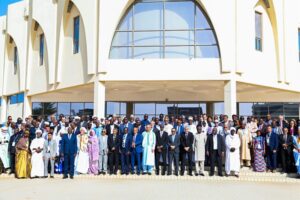In his opening speech, the Minister in charge of the General Secretariat of the Government highlighted that the Forum will strengthen the long-standing cultural and economic ties, and the fraternal relations that unite the peoples of the Sahel under the patronage of HE President of the Republic Mohamed Ould Cheikh El Ghazouani, who is working hard to make joint African action a priority strategic objective in order to achieve the desired unity.
He stressed that the Mauritanian government has embodied this objective in its general policy statement, in which the pastoral dimension is one of the main pillars of local development, and has set concrete goals, including self-sufficiency in milk production, export of red meat, and the development of value chains in other divisions.
Like other countries in the Sahel region, Mauritania hopes to accelerate the economic contribution of pastoralism by adopting participatory approaches and integrating it into development plans.
He stressed that Mauritania has supported and will continue to support all joint economic initiatives in all fields, the most important of which is this high-level forum on pastoralism, which will allow to raise the level of thinking to achieve these major goals, both those related to national policies in the pastoral field of the participating countries, as well as those related to regional cooperation and integration to achieve common goals on the ground.
For his part, the Minister of Animal Development, Mr. Mokhtar Gaguih, said that over the past ten years, the Sahel region has made significant progress thanks to joint efforts, highlighting that the Forum today comes to honor and strengthen this essential partnership, guided by a common vision of promoting sustainable development and resilience of our pastoral communities, which are often at the frontline of climate change, food security and poverty eradication.
He emphasized that the challenges are enormous, but the determination to build
In his opening speech, the Minister in charge of the General Secretariat of the Government stressed that the forum will strengthen the long-standing cultural and economic ties and fraternal relations that unite the peoples of the Sahel under the patronage of His Excellency the President of the Republic, Mr. Mohamed Ould Cheikh El Ghazouani, who is working hard to make joint African action a strategic priority goal in order to achieve the desired unity.
He stressed that the Mauritanian government embodied the aforementioned objective in its policy statement, in which the pastoral dimension is one of the main levers of local development, and set concrete goals, especially self-sufficiency in milk production, the export of red meat, in addition to the development of value chains in other divisions.
Mauritania, like other countries in the Sahel region, hopes to accelerate the economic contribution of pastoralism activities by adopting participatory approaches and integrating them into development plans.
Mauritania has supported and will continue to support all joint economic initiatives in all fields, the most important of which is this high-level forum on pastoralism, which will allow raising the level of thinking about achieving these major goals, whether those related to national policies in the pastoral field of the participating countries, or those related to regional cooperation and integration to achieve common goals on the ground, he said.
For his part, Mr Mokhtar Ould Gaguih, Minister of Animal Development, said that over the past ten years, the Sahel region has made great progress thanks to joint efforts, stressing that the forum today comes to honor and strengthen this fundamental partnership, guided by a common vision that is the vision of promoting sustainable development and the resilience of our pastoral communities, which are often on the front line to face the challenges of climate change, food security and the fight against poverty.
He stressed that the challenges are enormous, but the determination to build a better future for our pastoral communities and our peoples as a whole is an effective way to meet these challenges.
He thanked all our technical and financial partners for their valuable efforts in supporting animal development in general and the pastoral system in particular, which they have witnessed since the 2013 Nouakchott Declaration on the pastoral system, and we see it today through their keenness to make this important forum a success.
The Executive Secretary of the Permanent Joint Commission to Combat the Effects of Drought in the Sahel (CILS), Abdallah Mohamedou, stressed the importance of ensuring the production potential of the pastoral population in the Sahel region, in order to expand production and development activities to at least 30% in the next 5 to 10 years.
He added that the 2013 Nouakchott Declaration has now become a compass for SILS’ strategic partnerships with its partners in the field.
He also highlighted that the 2013 Declaration helped to formulate and implement several projects and programs aimed at strengthening pastoral capacities in the Sahel region, pointing to the importance of integration to stand in the face of crises in the region that affected the movement of regeneration and pastures.
For his part, the Regional Director for Sustainable Development for West and Central Africa at the World Bank, Mr. Shqib Al-Jinan, explained that the collective task of actors in this field is to value the strategic role of coastal lands, adding that the pastoral situation contributes in general to the sustainable management of natural resources.
He stressed that the World Bank will continue to provide open and renewed support and partnership, which will enable to ensure a prosperous future for pastoral communities in the Sahel.
The opening of the forum was attended by the Minister of Economy and Finance, Sid’ Ahmed Ould Bouh, members of the Permanent Joint Committee to Combat the Effects of Drought in the Sahel (CILS), the Assistant Governor of Nouakchott West, the Governor of the province of Tafragh Zeina, the Assistant Mayor of its municipality, and representatives of technical and financial partners and the Organization for Drought Control in the Sahel.



